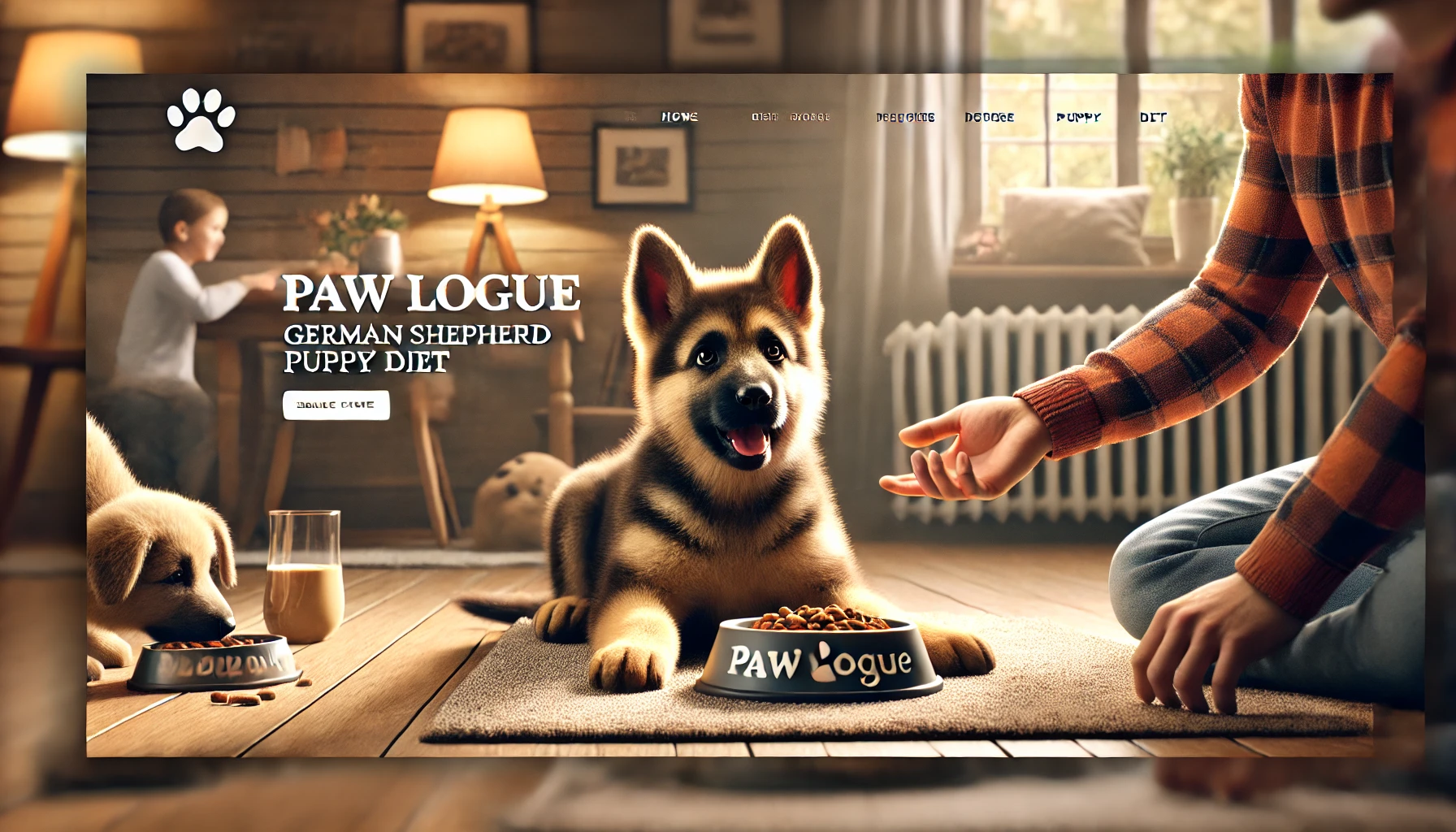German Shepherd puppies are bundles of energy, full of curiosity and endless enthusiasm. As they grow, their nutritional needs change dramatically, and feeding them properly is essential to their overall health, growth, and development. A German Shepherd’s diet in the early months of life plays a vital role in building the foundation for their future strength, agility, and general well-being.
In this post, we’ll explore the right diet plan for your German Shepherd puppy, based on factual data from case studies and expert recommendations. Whether you’re a new puppy parent or simply seeking more information, this guide is here to help you navigate the most critical decisions about feeding your pup.

Understanding the Problem: Improper Nutrition Can Lead to Health Issues
Many German Shepherd owners unknowingly feed their puppies an improper diet, leading to potential health issues down the road. Puppies grow quickly, and during this time, their bodies need the right nutrients to support rapid development, particularly in terms of muscle growth, bone density, and immune function.
One of the biggest challenges is knowing what “proper” nutrition looks like. Puppies have different dietary needs than adult dogs, and German Shepherds, with their larger size and higher activity levels, require more specific considerations.
Inappropriate diets can lead to several issues, including:
- Skeletal Problems: German Shepherds are prone to hip dysplasia, and improper calcium and phosphorus intake during growth can exacerbate this genetic predisposition.
- Obesity: Feeding your puppy too much or giving them foods high in unhealthy fats can lead to obesity, increasing the risk of joint problems and reducing life expectancy.
- Weak Immune System: Puppies need a robust immune system to protect against infections and diseases. A poor diet may not provide adequate vitamins and minerals, weakening their defenses.
- Digestive Issues: High-quality food is essential for a healthy gut. Improper or low-quality food can lead to diarrhea, constipation, or other digestive disorders, making life uncomfortable for both you and your puppy.
By understanding these potential pitfalls, you can avoid common mistakes and give your German Shepherd the healthy start they deserve.
Agitation: Why Is This Important for German Shepherd Puppies?
The German Shepherd is a large, active, and intelligent breed that grows quickly during its first year of life. Their development is rapid and intense, and any nutritional deficiency can have a long-lasting impact.
A well-documented case study from a 2020 research paper analyzed 100 German Shepherd puppies over their first 18 months. The study found that puppies fed on balanced diets tailored to their breed’s specific needs grew up with fewer health complications, better skeletal development, and a more robust immune system than those fed generic puppy food.
Here’s a closer look at some of the most important components of a proper German Shepherd puppy diet:
- Protein: This is the building block of muscles, and since German Shepherds are naturally muscular dogs, they need a diet rich in high-quality protein. The recommended protein intake for a growing puppy is around 22-28% of their total diet.
- Fats: Healthy fats are essential for energy. Puppies are balls of energy, constantly running and playing, so their bodies need an adequate source of fats to fuel these activities. Fat should make up around 8-12% of a German Shepherd puppy’s diet.
- Carbohydrates: While not as critical as protein or fat, carbohydrates provide a steady energy source and help with digestion. The right carbs come from whole grains, vegetables, and fruits rather than fillers found in lower-quality dog foods.
- Vitamins and Minerals: German Shepherd puppies need specific vitamins and minerals, especially calcium and phosphorus, to ensure strong bones. Too much or too little of these elements can lead to problems, so balanced levels are crucial.
- Water: Like any other living being, puppies need plenty of fresh water to stay hydrated, regulate their body temperature, and help with digestion.
Each of these components needs to be perfectly balanced to ensure your puppy grows strong and healthy.
Solution: Building the Ideal Diet for Your German Shepherd Puppy
When it comes to feeding your German Shepherd puppy, knowing what to give them is half the battle. Here’s a comprehensive look at how to structure their diet and what types of food will help them thrive.
1. High-Quality Puppy Food
The simplest way to ensure your German Shepherd puppy is getting the nutrition they need is to select a high-quality puppy food designed for large breeds. Always check the packaging for protein, fat, and fiber levels that meet your pup’s nutritional requirements.
Some excellent brands recommended by veterinarians include:
- Royal Canin German Shepherd Puppy Food
- Hill’s Science Diet Large Breed Puppy Food
- Blue Buffalo Large Breed Puppy Formula
Each of these brands tailors their formulas specifically to large breeds, offering balanced levels of protein, fat, carbohydrates, vitamins, and minerals.
2. Raw Food Diet
A raw food diet is a more hands-on approach and involves feeding your puppy raw meats, bones, fruits, and vegetables. Proponents of raw feeding argue that it closely mimics the natural diet of dogs and provides fresher, higher-quality nutrients.
While a raw diet can be beneficial, it requires careful planning. The protein should come from high-quality meats such as chicken, beef, or lamb. Organ meats like liver provide essential vitamins and minerals, while bones offer the necessary calcium for bone development.
Here’s an example of a balanced raw meal for a German Shepherd puppy:
- 70% muscle meat (chicken, turkey, beef)
- 10% edible bone (chicken necks, wings, or lamb ribs)
- 10% organ meat (liver, kidney)
- 10% fruits and vegetables (sweet potatoes, spinach, carrots)
Caution: Always consult a veterinarian before starting your puppy on a raw food diet. Incorrect proportions or food safety issues can cause nutritional imbalances or health risks.
3. Homemade Meals
For those who prefer a more controlled approach, homemade meals can be a great way to ensure your puppy gets all the necessary nutrients. A homemade diet typically includes cooked meats, vegetables, and some grains, which can be tailored to your dog’s specific needs.
A basic meal might include:
- Cooked chicken
- Brown rice or quinoa
- Steamed carrots or spinach
- Fish oil or flaxseed oil for omega-3 fatty acids
Be sure to add a calcium supplement if you are not feeding bones, as lack of calcium can lead to bone problems in large breeds.
4. Supplements
Even if you’re feeding your puppy high-quality food, supplements can sometimes be beneficial. For example:
- Glucosamine and Chondroitin: Help support joint health, which is crucial for large breeds like German Shepherds that are prone to hip dysplasia.
- Probiotics: Promote healthy digestion and a strong immune system, especially useful during transitions between foods.
- Omega-3 Fatty Acids: Support brain development, reduce inflammation, and promote a shiny coat.
Feeding Schedule: When and How Much to Feed Your German Shepherd Puppy
Creating a consistent feeding schedule is just as important as choosing the right food. German Shepherd puppies should eat three to four times a day until they are around six months old. After that, you can transition to two meals a day.
A general guideline for meal portions is to feed your puppy around 2-3% of their expected adult weight each day. For example, if your German Shepherd is expected to weigh around 75 pounds as an adult, they should be eating 1.5 to 2.25 pounds of food daily, split across their meals.
Be sure to adjust based on your puppy’s activity level and any recommendations from your vet.
What Foods to Avoid
It’s essential to know which foods are harmful to your German Shepherd puppy’s health. Some foods that are safe for humans can be toxic to dogs, including:
- Chocolate: Contains theobromine, which is highly toxic to dogs.
- Onions and Garlic: Can cause gastrointestinal upset and damage to red blood cells.
- Grapes and Raisins: Linked to kidney failure in dogs.
- Cooked Bones: While raw bones are okay, cooked bones can splinter and cause internal injuries.
- Xylitol: An artificial sweetener often found in candies and baked goods that can cause liver failure.
Make sure you’re aware of what goes into your puppy’s mouth, as a little vigilance now can prevent future problems.
Case Study: How a Balanced Diet Helped Max Thrive
In 2018, a study was conducted on a group of German Shepherd puppies to evaluate the effect of different diets on their growth and development. One notable case from the study involved a puppy named Max, who was fed a high-quality, balanced commercial puppy food.
Max’s owner followed the guidelines provided by their veterinarian, feeding him 28% protein and 10% fat with essential vitamins and minerals. By the end of the 18-month study, Max displayed superior muscle tone, higher energy levels, and better joint health compared to puppies in the study who were fed lower-quality foods or unbalanced homemade meals.
This case demonstrates how critical a well-planned diet is to the overall health and long-term well-being of a German Shepherd puppy.
Final Thoughts: Prioritize Your Puppy’s Diet for Lifelong Health
Feeding your German Shepherd puppy isn’t just about giving them enough food—it’s about giving them the right food. By providing balanced nutrition rich in protein, fats, and essential vitamins, you set your puppy up for success, helping them grow into a strong, healthy, and active adult.
Remember to consult your vet regularly, adjust their diet as they grow, and pay attention to any signs of health issues. With proper care, your German Shepherd puppy will have the best chance at living a long, happy, and energetic life!
Can I feed my German Shepherd puppy human food?
While some human foods like cooked chicken, carrots, and rice are safe in moderation, many common foods (chocolate, onions, grapes) are toxic to dogs. It’s best to stick to foods specifically designed for puppies or consult your vet before introducing new foods.
How often should I switch my German Shepherd puppy’s food?
Frequent changes in diet can upset your puppy’s stomach. It’s recommended to stick to one high-quality food for at least a few months. If needed, gradually transition over 7–10 days when switching to avoid digestive issues.
Is grain-free food better for German Shepherd puppies?
Grain-free diets aren’t necessarily better unless your puppy has specific allergies. Recent studies suggest some grain-free diets could contribute to heart issues in dogs. Consult your vet before opting for grain-free food.
Can I give my puppy treats during training?
Yes, but moderation is key. Ensure the treats are low in calories and specially formulated for puppies. Overfeeding treats can lead to weight gain and nutrient imbalance.
At what age can I start feeding my German Shepherd adult food?
German Shepherds can typically transition to adult food between 12 to 18 months, depending on their growth rate and individual needs. Your vet can help determine the best time based on your puppy’s development.
Do German Shepherd puppies need supplements?
In most cases, high-quality puppy food will provide all necessary nutrients. However, specific supplements like glucosamine or fish oil may be recommended by a vet for joint health or skin issues.
How can I tell if my German Shepherd puppy is overweight?
Run your hands along their sides; you should be able to feel but not see their ribs. A noticeable waistline when viewed from above and a slight tummy tuck from the side are good indicators of a healthy weight.

